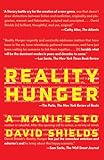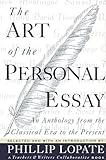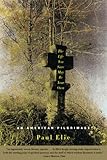1.
 Two years in print, David Shield’s Reality Hunger: A Manifesto, retains its provocative allure as he explores what he argues is the arbitrary distinction between non-fiction and fiction, what’s real and what is made up. His manifesto is still fun and easy to read –– open up to any page and you get an aphorism or mini-essay, inciting you to rally to his cause. Here’s a short entry I picked by randomly opening the book, on pg. 133:
Two years in print, David Shield’s Reality Hunger: A Manifesto, retains its provocative allure as he explores what he argues is the arbitrary distinction between non-fiction and fiction, what’s real and what is made up. His manifesto is still fun and easy to read –– open up to any page and you get an aphorism or mini-essay, inciting you to rally to his cause. Here’s a short entry I picked by randomly opening the book, on pg. 133:
391
A conversational dynamic––the desire for contact––is ingrained in the form.
 Interesting, and it certainly makes sense (he’s talking about non-fiction), but who said that? To find out, you can turn to the list of citations in the Appendix, which Shields introduces with a disclaimer, saying the Random House lawyers forced him to put the citations in, as he prefers you not to know who wrote what, and you’ll see that number 391 is associated with Philip Lopate’s The Art of the Personal Essay. No page number is given, for this or any of the other citations, but if you enter key terms from the passage into Amazon.com’s “Look Inside The Book,” you’ll find the source, on page xxv of Lopate’s book, which Shields truncated but otherwise didn’t change. This is interesting, since, as Shields admits, sometimes he rewrites his quotes to suit his artistic goals.
Interesting, and it certainly makes sense (he’s talking about non-fiction), but who said that? To find out, you can turn to the list of citations in the Appendix, which Shields introduces with a disclaimer, saying the Random House lawyers forced him to put the citations in, as he prefers you not to know who wrote what, and you’ll see that number 391 is associated with Philip Lopate’s The Art of the Personal Essay. No page number is given, for this or any of the other citations, but if you enter key terms from the passage into Amazon.com’s “Look Inside The Book,” you’ll find the source, on page xxv of Lopate’s book, which Shields truncated but otherwise didn’t change. This is interesting, since, as Shields admits, sometimes he rewrites his quotes to suit his artistic goals.
According to his interview with The Millions (Part II), Shields doesn’t encourage these investigations into the sources of his material. He says:
My ideal reader is not going to be a quote-spotter or a cite-sifter. I very much want the reader to experience a certain vertigo when reading the book—is this Shields? Is it Chung? [Our interviewer]. Is it some odd combination of the two? Is it both? Is it neither? Is it all of us?
Shields wants us, as he advises in his disclaimer in the Appendix, to “simply grab a sharp pair of scissors or a razor blade or box cutter” and cut out the citation pages and read the book as he originally intended. But isn’t this part of the conversational dynamic, as well, to follow his quotes and appropriations to the original sources, to get further provoked, entertained, and delighted? And why should I listen to Shields, anyway? He clearly takes delight in blurring the distinction between truth and fiction, even suggesting that he sometimes lies. Who made him the boss?
2.

 When I sat down to talk to Paul Elie about his new book, Reinventing Bach, I had a question for him that was inspired by Shields’ book: I wanted to ask if he believed that writing about his experience and passion for Bach in such a direct and palpable way satisfied the reader’s hunger for the reality that Shields is talking about, that if he believed that by cutting through the obfuscations of most biographies with their mounds of academic detail, be brought us closer to the “real” experience. But Elie brought up Shields before I did, to lament how Shields not only misquoted him in Reality Hunger, but also gravely misrepresented the overall intent of his work, and how recently this has led to another author, Gideon Lewis-Kraus, perpetuating this misrepresentation in his new book, A Sense of Direction. I followed the trail of the citations to trace how the original source in Elie’s book morphed via Shields to reach the pages of Lewis-Kraus, and see for myself whether Elie was justified in accusing Shields of falsifying his work.
When I sat down to talk to Paul Elie about his new book, Reinventing Bach, I had a question for him that was inspired by Shields’ book: I wanted to ask if he believed that writing about his experience and passion for Bach in such a direct and palpable way satisfied the reader’s hunger for the reality that Shields is talking about, that if he believed that by cutting through the obfuscations of most biographies with their mounds of academic detail, be brought us closer to the “real” experience. But Elie brought up Shields before I did, to lament how Shields not only misquoted him in Reality Hunger, but also gravely misrepresented the overall intent of his work, and how recently this has led to another author, Gideon Lewis-Kraus, perpetuating this misrepresentation in his new book, A Sense of Direction. I followed the trail of the citations to trace how the original source in Elie’s book morphed via Shields to reach the pages of Lewis-Kraus, and see for myself whether Elie was justified in accusing Shields of falsifying his work.
Let’s start the investigation with the entry in question in Shields’s manifesto, on page 182:
547
Contemporary culture makes pilgrimage impossible. Experience is always secondhand, planned and described for one’s consumption by others in advance. Even the rare, authentically direct experience is spoiled by self-consciousness. We’re doomed to an imitation of life.
 When I read the manifesto for the first time, over a year ago, I was constantly flipping back and forth between the entries and citations, and learned that 547 was from Paul Elie’s first book, The Life You Save May Be Your Own, which was, unlike most of the entries, from a book I’d actually read. I didn’t look up the source of the quote, though, not then –– the subtitle of Elie’s first book was An American Pilgrimage, so the passage was resonant of his subject matter, at least at a glance. And if the stridency or negativity of the passage set off any warning bells, I don’t remember them, though I may indeed have experienced a tinge of the vertigo that Shields says he likes to provoke, as the passage is not characteristic of Elie’s book, which wasn’t a polemic with a negative spin. It’s anything but. I should have been astute enough to realize that “We’re doomed to an imitation of life” wasn’t something Elie was likely to have ever written, but I was probably too excited to keep reading the manifesto to find out what cool passage-citations I’d discover next. In retrospect, I wish I’d slowed down and read more carefully.
When I read the manifesto for the first time, over a year ago, I was constantly flipping back and forth between the entries and citations, and learned that 547 was from Paul Elie’s first book, The Life You Save May Be Your Own, which was, unlike most of the entries, from a book I’d actually read. I didn’t look up the source of the quote, though, not then –– the subtitle of Elie’s first book was An American Pilgrimage, so the passage was resonant of his subject matter, at least at a glance. And if the stridency or negativity of the passage set off any warning bells, I don’t remember them, though I may indeed have experienced a tinge of the vertigo that Shields says he likes to provoke, as the passage is not characteristic of Elie’s book, which wasn’t a polemic with a negative spin. It’s anything but. I should have been astute enough to realize that “We’re doomed to an imitation of life” wasn’t something Elie was likely to have ever written, but I was probably too excited to keep reading the manifesto to find out what cool passage-citations I’d discover next. In retrospect, I wish I’d slowed down and read more carefully.
Using “Look Inside the Book” again, I entered different search terms from Shields’s passage to find the source of his entry in Elie’s book –– “contemporary culture” yielded zero results, but “spoiled by self-consciousness” led me page 278, to a discussion of Walker Percy’s essay, “The Loss of the Creature,” which Elie described as “an essay about the ways language stands between the self and reality.” Elie summarizes and comments on a story Percy tells in his essay about tourists struggling to find an authentic experience, including an American couple who “leave town, get lost, and stumble on some natives performing a ‘corn dance’ in a remote village.” The couple, according to Percy’s story, convinced this was the authentic experience they were looking for, bring an ethnologist back with them, to validate it and get his approval. Then comes the encapsulated inspiration for Shield’s entry. Elie writes:
Percy’s point –– in the language of pilgrimage –– is that the modern predicament makes pilgrimage impossible. In the modern world (now generally called postmodern), all experience is always secondhand, planned, and described for one’s consumption by others in advance. Even the rare authentically direct experience is spoiled by modern self-consciousness. The modern person is doomed to an imitation of life; the self cannot escape itself and know the world or the Other.
Let’s compare Elie’s original passage and Shields’s subsequent riff, restated here so you don’t have to scroll up and down.
547
Contemporary culture makes pilgrimage impossible. Experience is always secondhand, planned and described for one’s consumption by others in advance. Even the rare, authentically direct experience is spoiled by self-consciousness. We’re doomed to an imitation of life.
You might argue that Shields keeps the gist of the original, and, like any good aphorist, even improves on the point being made by streamlining the main ideas. Shields changes the existential term “modern predicament” to the easier-to-relate to “contemporary culture,” in order to paint a more tangible villain for the crime, and he also gets rid of the religious aspect of the passage by editing out the last part: “the self cannot escape itself and know the world or the Other” –– meaning God or the divine. Nor does he bother including anything from the subsequent paragraph, which introduces Elie’s hopeful counter perspective –– “The self can try, however. That is Percy’s real point.” As he does throughout the book, Elie offers a brilliant, nuanced evocation of a great writer’s ideas –– in this case, Walker Percy’s –– from various angles.
In addition to extracting the quote from a larger narrative and changing words, Shields also purges any reference to the original source of these ideas: Walker Percy himself. So instead of us readers clearly understanding that in the passage Elie is not presenting his own argument, but clearly providing a summarization and commentary on Walker Percy’s essay, we are led to believe through the citation that Elie himself argued for, believed, and was trying to convince us that “we’re doomed to an imitation of life.”
To get at the nuance of this is difficult without reading Elie’s book, but trust me, Elie is not saying “we’re doomed to an imitation of life.” As he stated in our interview, “the thrust of both my books is that you can live authentically and the obvious fact that experience is mediated to us is not necessarily crippling. It’s often enabling.”
But what’s the harm? Shields told us what he was up to, in that disclaimer in the Appendix, that in his book he is appropriating and plagiarizing and us not knowing when and where is part of the fun. And if Elie has a right to be offended, was it even Shields’s fault? Why not blame the Random House attorneys who forced Shields to put in the citations (Upon the threat of what? They wouldn’t publish the book?). If the attorneys hadn’t insisted, it was unlikely anyone would have associated the condensed and rewritten passage in Shields’s book with Elie’s original in the first place. (I studied the book for an interview we did, and I didn’t see the connection). And as for the quote-spotters and cite-sifters who do spot the connection, get a life! As Shields says in his Appendix, reality can’t be copyrighted.
Elie may have forgiven Shields for taking his self-avowed creative license if Elie hadn’t received emails this spring telling him that he was quoted in a new memoir by Gideon Lewis-Kraus, A Sense of Direction. Here’s the quote in question in Lewis-Kraus’s book, which I found on page 236.
Paul Elie writes, “Contemporary culture makes pilgrimage impossible. Experience is always second-hand, planned and described for one’s consumption by others in advance. Even the rare, authentically direct experience is spoiled by self-consciousness. We’re doomed to an imitation of life.”
Yes, you read it right, this quote that Lewis-Kraus attributes to Elie, is not from Elie’s book at all, but an exact quote of the passage in Shields’s book (that is, besides adding the dash to “secondhand”). Lewis-Kraus is quoting Shields, not Elie. And here’s what Lewis-Kraus says next, about the (mis)quote:
Of course, life is never an imitation of life; life is simply life. And no experience is any more or less direct than any other one. But the point of view Elie offers is worth considering, more for its assumptions than its shoddy lament. Being self-conscious about an experience means, to Elie, standing at a remove from it. This remove is created by the fact that we all know, at any given time, that there is an associated cost, that we could be doing something else. (Author’s emphasis).
Let’s review. Lewis-Kraus first misquotes Elie, then he proceeds to contradict what he misquotes Elie had written (“life is never an imitation of life; life is simply life”), and then characterizes what he wrongly alleges Elie having written as a “shoddy lament.”
Since the word “shoddy” struck me as especially harsh here, I looked it up. According to the Free Dictionary, shoddy means: 1. Made of or containing inferior material. 2. a. Of poor quality or craft. b. Rundown; shabby. 3. Dishonest or reprehensible: shoddy business practices. 4. Conspicuously and cheaply imitative. I understand now, with a healthy dash of the vertigo Shields hoped to provoke in me, why Elie was irked. It irks me to read Lewis-Kraus’s excerpt, which I’m afraid epitomizes the term shoddy. Not only does Lewis-Kraus screw up the attribution, assigning it not to Shields but to Elie, he disparages what he says is Elie’s work, and then to top it off, carries on with statements that Lewis-Kraus might believe — this business about self-consciousness and knowing we could be doing something else — that don’t follow from anything that Shields or Elie or Percy wrote.
So let’s agree this is shoddy work. So is it Lewis-Kraus’s fault or maybe his publisher’s? Unlike in Shields’s manifesto, Lewis-Kraus includes no citations at all, with page numbers or not. If he had included citations, perhaps a thoughtful editor would have traced the misquote back to that artsy prankster Shields and this mess would have been averted. But no citations; this is art.
Or maybe we should let Lewis-Kraus off the hook and blame Shields instead? He is the perp, after all, who put this meme out there, however he couched it, associating his shoddy lament (Lewis-Kraus’s term, not mine) with Elie, who I reiterate did not write either of these identical passages attributed to him by Shields and Lewis-Kraus. But whether Shields is culpable or not, he may be delighted at this cascade of appropriations and misquotes –– and why wouldn’t he be? They prompted this inquiry, which will in turn perhaps spur more controversy and further the reality hunger conversation that he has gleefully provoked in our literary culture. Or: maybe he feels, like I do, or any reasonable person who takes the time to follow the trail, a sense we may have lost something with this shoddiness masquerading as art.









